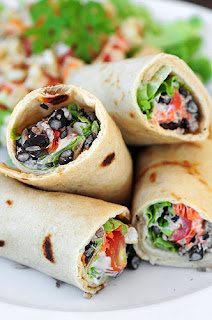A meat eater might view a vegetarian diet as being boring, but a vegetarian diet can be the complete opposite. In order to accomplish an appealing vegetarian diet, it is important to have a good vegetarian diet meal plan.
Since animal protein is non existent in a vegetarian's diet, some important ingredients get more attention than they usually do in other diets. Plant foods, and grains take on the role of main courses.
 The Vegetarian Diet Meal Plan
The Vegetarian Diet Meal Plan
1. Use a wide variety of plant protein sources at each meal, such as legumes, grain products, nuts and seeds, and vegetables. Use small portions of nuts and seeds in dishes.
2. Use a wide variety of vegetables. Steaming, stir frying, or microwaving vegetables retains flavor, nutrients, and color.
3. Choose low fat and fat free varieties of milk and milk products, and limit the use of eggs. This is crucial to prevent a high intake of saturated fat, which is found in whole milk, low fat milk, regular cheeses, eggs, and other foods.
4. Consume more dishes made with soybean-based products like tofu and tempeh. Soybeans are unique because they contain the only plant protein that is nutritionally equal to animal protein.
5. Consume foods that contain nutrients of special importance to vegetarians. Foods with good sources of Vitamin B12, Vitamin D, Calcium, Iron, Zinc, and Linolenic Acid.
This is a low fat diet plan that will help you lose weight while still getting enough protein each day. Like any other diet plan you have to stay committed to it and you will begin to lose the weight you desire.
By Jennifer Vanderbilt
Since animal protein is non existent in a vegetarian's diet, some important ingredients get more attention than they usually do in other diets. Plant foods, and grains take on the role of main courses.
 The Vegetarian Diet Meal Plan
The Vegetarian Diet Meal Plan1. Use a wide variety of plant protein sources at each meal, such as legumes, grain products, nuts and seeds, and vegetables. Use small portions of nuts and seeds in dishes.
2. Use a wide variety of vegetables. Steaming, stir frying, or microwaving vegetables retains flavor, nutrients, and color.
3. Choose low fat and fat free varieties of milk and milk products, and limit the use of eggs. This is crucial to prevent a high intake of saturated fat, which is found in whole milk, low fat milk, regular cheeses, eggs, and other foods.
4. Consume more dishes made with soybean-based products like tofu and tempeh. Soybeans are unique because they contain the only plant protein that is nutritionally equal to animal protein.
5. Consume foods that contain nutrients of special importance to vegetarians. Foods with good sources of Vitamin B12, Vitamin D, Calcium, Iron, Zinc, and Linolenic Acid.
This is a low fat diet plan that will help you lose weight while still getting enough protein each day. Like any other diet plan you have to stay committed to it and you will begin to lose the weight you desire.
By Jennifer Vanderbilt
No comments:
Post a Comment